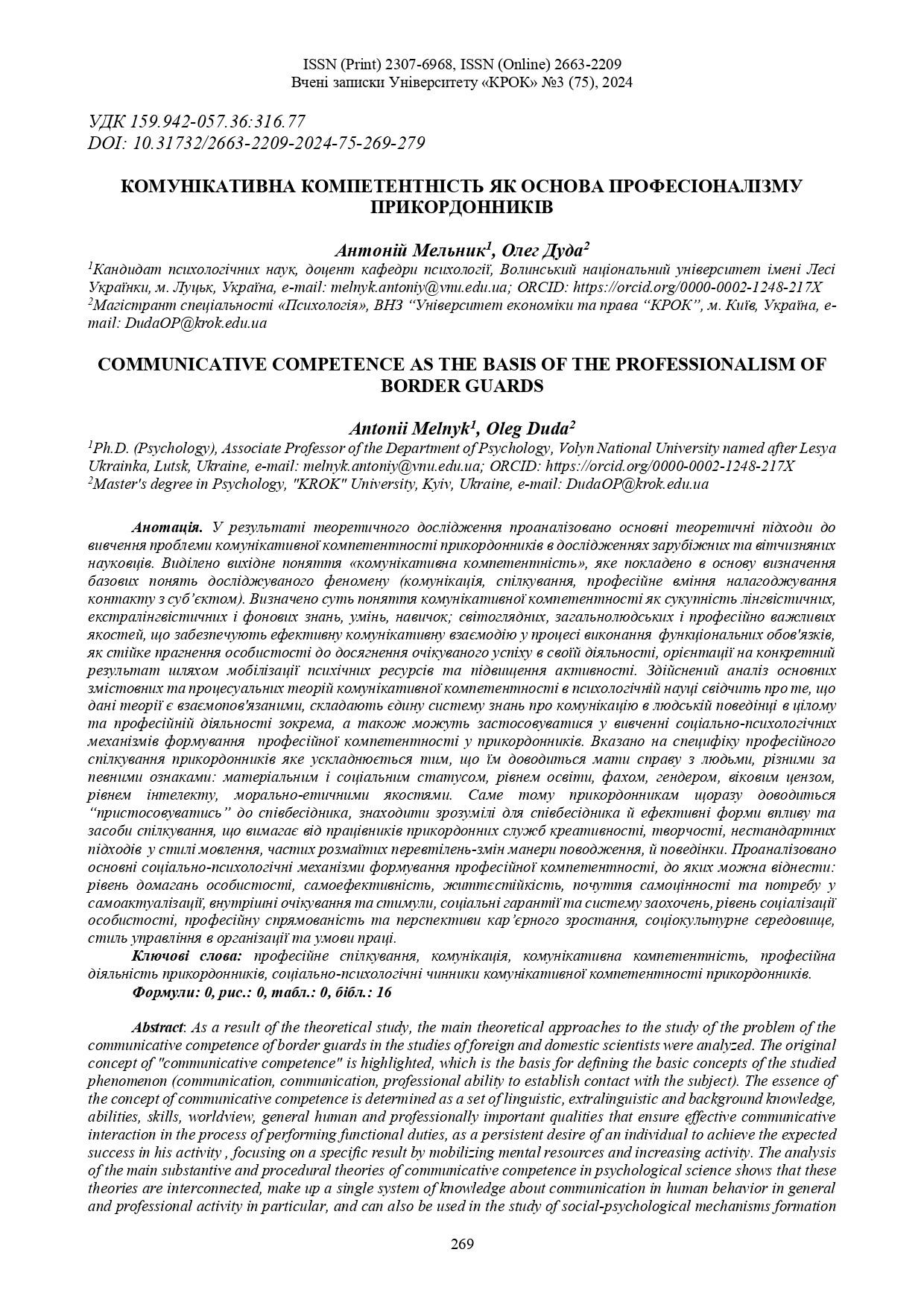COMMUNICATIVE COMPETENCE AS THE BASIS OF THE PROFESSIONALISM OF BORDER GUARDS
DOI:
https://doi.org/10.31732/2663-2209-2024-75-269-279Keywords:
professional communication, communication, communicative competence, professional activity of border guards, socio-psychological factors of communicative competence of border guardsAbstract
As a result of the theoretical study, the main theoretical approaches to the study of the problem of the communicative competence of border guards in the studies of foreign and domestic scientists were analyzed. The original concept of "communicative competence" is highlighted, which is the basis for defining the basic concepts of the studied phenomenon (communication, communication, professional ability to establish contact with the subject). The essence of the concept of communicative competence is determined as a set of linguistic, extralinguistic and background knowledge, abilities, skills, worldview, general human and professionally important qualities that ensure effective communicative interaction in the process of performing functional duties, as a persistent desire of an individual to achieve the expected success in his activity , focusing on a specific result by mobilizing mental resources and increasing activity. The analysis of the main substantive and procedural theories of communicative competence in psychological science shows that these theories are interconnected, make up a single system of knowledge about communication in human behavior in general and professional activity in particular, and can also be used in the study of social-psychological mechanisms formation of professional competence of border guards. The specifics of professional communication of border guards are indicated, which is complicated by the fact that they have to deal with people who differ in certain characteristics: material and social status, level of education, profession, gender, age qualification, level of intelligence, moral and ethical qualities. That is why border guards every time have to "adapt" to the interlocutor, find effective forms of influence and means of communication that are understandable for the interlocutor and means of communication, which also requires creativity, creativity, non-standard approaches in the style of speech, frequent various reincarnations-changes in manners and behavior. The main socio-psychological mechanisms of the formation of professional competence are analyzed, which include: the level of personal demands, self-efficacy, sustainability, sense of self-worth and the need for self-actualization, internal expectations and incentives, social guarantees and the system of incentives, the level of socialization of the individual, professional orientation and career prospects growth, socio-cultural environment, management style in the organization and working conditions.
Downloads
References
Бабіч, О. В. (2017) Рекомендації науково-педагогічному складу щодо вдосконалення комунікативно-дискурсивної культури офіцерів прикордонників. Хмельницький : НАДПСУ. 50 с.
Берестецька, Н. В. (2008) Підготовка офіцерів-прикордонників до професійного спілкування у процесі навчання гуманітарних дисциплін. Хмельницький, 244 с.
Волошина, Н. В. (1998) Особливості комунікативних здібностей особистості. Психолого-педагогічна наука і суспільна ідеологія: матеріали методичного семінару АПН України, 12 листопада 1998 р. Київ, 301-305.
Гринчук, О. (2002) Проблема спілкування в структурі підготовки менеджера до управлінської діяльності. Філософія, соціологія, психологія. Збірник наукових праць. Івано-Франківськ, Вип.7, ч. 2. 143–150.
Добротвор, О. В. (2013) Комунікативна компетентність як предмет наукового дослідження. Педагогічний процес: теорія і практика. 3. 56–62.
Заброцький, М. М., Максименко, С. Д. (2005) Технологія спілкування комунікативна компетентність учителя: сутність і шляхи формування: посібник. Київ: Главник, 112 с.
Культура прикордонного контролю у пунктах пропуску через державний кордон України: навчальний посібник. Хмельницький: Видавництво Національної академії Держприкордонслужби України ім. Б. Хмельницького, 2010. 142 с.
Лук'янчук, Н. В. (2012) Комунікативна компетентність особистості: посібник. НАПН України, Інститут обдарованості дитини. Київ: Інформаційні системи, 130 с.
Мисечко, О. В. (2006) Педагогічна технологія формування вмінь службового спілкування у офіцерів-прикордонників. Хмельницький, 186 с.
Міжкультурна компетентність спілкування сучасного фахівця Державної прикордонної служби України. (2012) Збірник наукових праць Національної академії Державної прикордонної служби України. Серія: педагогічні та психологічні науки. Хмельницький: Вид-во НАДПСУ. 65. 5–8.
Москаленко, В. В. (2005) Соціальна психологія : підручник. Київ : Центр навчальної літератури, 624 с.
Москалець, В. П. (2012) Види діяльності з позицій суб'єктного підходу в психології. Психологія і суспільство. Український теоретико-методологічний соціогуманітарний часопис. 4 (50). 66–78.
Москалець, В. П. (2013) Психологія особистості: навчальний посібник. Київ: Видавництво “Центр учбової літератури”, 262 с.
Про державний кордон України: Закон України від 4 листоп. 1991 р. № 1777–ХІІ. Комп'ютерна інформаційно-правова система “Ліга”. URL: www.liga. net. (дата звернення: 11.12.2021р.)
Орбан-Лембрик, Л. Е. (2004) Соціальна психологія : у 2 кн. кн. 2 : Соціальна психологія особистості і спілкування. Київ : Либідь, 541 с.
Прозорова, Є. В. (2000) Педагогічні умови формування комунікативної компетентності. Вісник Харківського національного педагогічного університету імені Г. С. Сковороди: Психологія. 2. 91–102.
Федоренко, О. І. (2012) Види комунікативних вмінь та їх роль у професійній діяльності працівників правоохоронних органів. Вісник Національної академії Державної прикордонної служби України. Вип. 1. URL: http://nbuv.gov.ua/j–pdf/Vnadps_2012_1_21.pdf

Downloads
Published
How to Cite
Issue
Section
License

This work is licensed under a Creative Commons Attribution-NonCommercial 4.0 International License.

